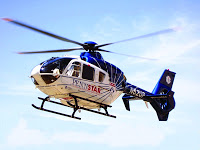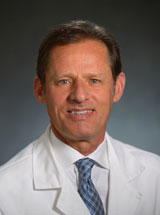Neuroscience
Mary Hess, stroke survivor, shares her story of how Penn Medicine’s telestroke program saved her life and gave her more time to enjoy the things she loves...
In the summer of 2011, 62 year-old Mary Hess was able to step away from her busy schedule as Executive Director and Registered Nurse at a large Philadelphia nursing home and go on vacation with her family. In New Jersey, on the very first day of her vacation, Mary began experiencing weakness in her arm and leg. Prior to this episode, Mary began noticing occasions of weakness, which spontaneously resolved.
When Mary and her daughter arrived at the local emergency room, she was told she was having a stroke. She had developed a left sided hemiplegia and neglect, which is paralysis of one side of the body. Thanks to the telestroke system at Cape May Regional Medical Center, local doctors have immediate access to Penn stroke specialists. The telestroke system and neuro-emergency transfer protocol at Cape May Regional Medical Center are part of the Penn NeuroRescue Program and provide fast, expert and effective care for Jersey shore patients experiencing a neurological emergency. In many cases, patients are transported via helicopter to Penn Medicine. The PennSTAR flight program provides critical care air medical transportation within a 100-mile radius of Penn Medicine’s three hospitals.
Mary was evaluated by Scott Kasner, MD, Director of the Penn Stroke Center. Mary noted, “The program was successful and worked pretty seamlessly. If this had happened before telestroke, it’s very possible I would not be sitting here talking to you.”
Mary and her daughter were fully aware that Cape May Regional and Penn physicians were communicating and were present as the doctors evaluated Mary and planned for her treatment. Mary received the “clot-busting” drug called tissue plasminogen activator (TPA) and then was transferred to Penn Medicine. Upon arrival at the Hospital of the University of Pennsylvania (HUP), further evaluation revealed a significant narrowing of the right carotid artery (called stenosis) that was likely the cause of her stroke. On July 6, Penn neurosurgeon Eric Zager, MD performed a carotid endarterectomy, a procedure that removes plaque from the artery.
“Dr. Zager was an excellent surgeon, as were his fellows and residents. They kept me very informed of the risks versus the benefits of the procedure. I couldn’t have asked for a better experience,” said Mary.
Following her surgery, Mary continued her care at Penn Medicine with Dr. Kasner.
She remarked, “The doctors and nurses at Penn Medicine kept me and my family totally informed the entire time. Dr. Kasner knew there had to be some reason for the stroke, because otherwise I am a pretty healthy person. He even helped expedite the approval process for my rehab with my insurance.”
Thankfully, within the week, Mary had that surgery at Penn, and all was fine for years.
Eleven days after surgery, Mary was able to return to a rehabilitation facility close to her home to continue physical and occupational therapy. Mary’s biggest concern following her stroke was being able to go back to work.
“I am too young to retire,” she said. Mary stays active by walking as much as she can and her next goal is to start playing golf again. Except for some weakness in her fingers, Mary has no residual effects from her stroke. “I would not be sitting here if it wasn’t for them,” Mary said of her care givers. “I really appreciate everything Penn did for me.”
- Introducing The New Penn Neuroscience Center
On February 23, 2015, the Penn Neuroscience Center officially opened, with the mission of providing a new level of specialty care for those suffering from or at risk for complex neurological disorders. The outpatient facility joins together our neurology,...
- Isaac Chen, Md, Joins Penn Neurosurgery
H. Isaac Chen, MD, has joined Penn Neurosurgery as an Assistant Professor. Dr. Chen received his undergraduate degree in biochemical sciences from Harvard University; subsequently, he received his medical degree from the University of Pennsylvania. He...
- Five Surgeons From Penn Neurosurgery Earn 'top Doc' Honors
Each year, Philadelphia magazine recognizes the area’s outstanding doctors in their Top Doctors issue. The list is viewed as a “gold standard for those seeking the finest medical care in the Philadelphia area.” We are pleased to announce that five...
- Five Surgeons From Penn Neurosurgery Earn 'top Doc' Honors
Each year, Philadelphia magazine recognizes the area’s outstanding doctors in their Top Doctors issue. The list is viewed as a “gold standard for those seeking the finest medical care in the Philadelphia area.” We are pleased to announce that five...
- Five Penn Neurosurgeons Make Top Doctors List
Each year, Philadelphia magazine recognizes the area’s outstanding doctors in their annual Top Doctors list. The list is viewed as a “gold standard for those seeking the finest medical care in the Philadelphia area.” We are pleased to announce...
Neuroscience
Patient Story: Mary Hess
Mary Hess, stroke survivor, shares her story of how Penn Medicine’s telestroke program saved her life and gave her more time to enjoy the things she loves...
"I would not be sitting here if it wasn’t for them...I really appreciate everything Penn did for me."– Mary Hess, 62
 |
| Photo Caption: PennSTAR provides critical care air medical transportation |
When Mary and her daughter arrived at the local emergency room, she was told she was having a stroke. She had developed a left sided hemiplegia and neglect, which is paralysis of one side of the body. Thanks to the telestroke system at Cape May Regional Medical Center, local doctors have immediate access to Penn stroke specialists. The telestroke system and neuro-emergency transfer protocol at Cape May Regional Medical Center are part of the Penn NeuroRescue Program and provide fast, expert and effective care for Jersey shore patients experiencing a neurological emergency. In many cases, patients are transported via helicopter to Penn Medicine. The PennSTAR flight program provides critical care air medical transportation within a 100-mile radius of Penn Medicine’s three hospitals.
Mary was evaluated by Scott Kasner, MD, Director of the Penn Stroke Center. Mary noted, “The program was successful and worked pretty seamlessly. If this had happened before telestroke, it’s very possible I would not be sitting here talking to you.”
 |
| Photo Caption: Eric Zager, MD |
“Dr. Zager was an excellent surgeon, as were his fellows and residents. They kept me very informed of the risks versus the benefits of the procedure. I couldn’t have asked for a better experience,” said Mary.
Following her surgery, Mary continued her care at Penn Medicine with Dr. Kasner.
She remarked, “The doctors and nurses at Penn Medicine kept me and my family totally informed the entire time. Dr. Kasner knew there had to be some reason for the stroke, because otherwise I am a pretty healthy person. He even helped expedite the approval process for my rehab with my insurance.”
Thankfully, within the week, Mary had that surgery at Penn, and all was fine for years.
Eleven days after surgery, Mary was able to return to a rehabilitation facility close to her home to continue physical and occupational therapy. Mary’s biggest concern following her stroke was being able to go back to work.
“I am too young to retire,” she said. Mary stays active by walking as much as she can and her next goal is to start playing golf again. Except for some weakness in her fingers, Mary has no residual effects from her stroke. “I would not be sitting here if it wasn’t for them,” Mary said of her care givers. “I really appreciate everything Penn did for me.”
Penn Neurosurgery provides comprehensive surgical management of disorders of the brain, spinal cord and peripheral nervous system.
Learn more about Penn Neurosurgery.
Learn more about Penn Neurosurgery.
- Introducing The New Penn Neuroscience Center
On February 23, 2015, the Penn Neuroscience Center officially opened, with the mission of providing a new level of specialty care for those suffering from or at risk for complex neurological disorders. The outpatient facility joins together our neurology,...
- Isaac Chen, Md, Joins Penn Neurosurgery
H. Isaac Chen, MD, has joined Penn Neurosurgery as an Assistant Professor. Dr. Chen received his undergraduate degree in biochemical sciences from Harvard University; subsequently, he received his medical degree from the University of Pennsylvania. He...
- Five Surgeons From Penn Neurosurgery Earn 'top Doc' Honors
Each year, Philadelphia magazine recognizes the area’s outstanding doctors in their Top Doctors issue. The list is viewed as a “gold standard for those seeking the finest medical care in the Philadelphia area.” We are pleased to announce that five...
- Five Surgeons From Penn Neurosurgery Earn 'top Doc' Honors
Each year, Philadelphia magazine recognizes the area’s outstanding doctors in their Top Doctors issue. The list is viewed as a “gold standard for those seeking the finest medical care in the Philadelphia area.” We are pleased to announce that five...
- Five Penn Neurosurgeons Make Top Doctors List
Each year, Philadelphia magazine recognizes the area’s outstanding doctors in their annual Top Doctors list. The list is viewed as a “gold standard for those seeking the finest medical care in the Philadelphia area.” We are pleased to announce...
